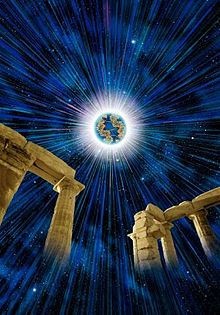- Cosmic Voyage
-
For the 1936 Soviet Science Fiction film, see Kosmicheskiy reys: Fantasticheskaya novella.
Cosmic Voyage 
Movie poster, rating: 7.4/10 (133 votes)Directed by Bayley Silleck Produced by Jeffrey Marvin, Bayley Silleck Written by Michael Miner, Bayley Silleck Narrated by Morgan Freeman Music by David Michael Frank Distributed by Warner Bros. Release date(s) 1996 (USA theatrical release) Running time 36 min. Country USA Language English Cosmic Voyage is a 1996 short documentary produced in the IMAX format, directed by Bayley Silleck, produced by Jeffrey Marvin, and narrated by Morgan Freeman. The film was presented by the Smithsonian Institution's National Air and Space Museum,[1] and played in IMAX theaters worldwide. The film has been made available to private audiences by its release to DVD.
Contents
Synopsis
"Cosmic Voyage" takes on a similar format as the National Film Board of Canada's "Cosmic Zoom", and IBM's classic "Powers of Ten" educational video. The film takes viewers on a journey through forty-two orders of magnitude, beginning at a celebration in Italy to zoom to the edge of the observable universe. The view descends back to earth, and later zooms in upon a raindrop on a leaf, to the level of sub-atomic particles ("quarks").
In addition, the film offers some brief insight on the Big Bang Theory, black holes, and the development of our Solar System. It also simulates a journey through Fermilab's Tevatron particle accelerator in Chicago, where an atom collision is depicted.
Awards
"Cosmic Voyage" was nominated for a 1997 Oscar Award under the category of Best Documentary Short Subject.[2]
References
- ^ "IMAX Audiences Embark on a Cosmic Voyage Through Time and Space". Smithsonian National Air and Space Museum. June 24, 1996. http://www.nasm.si.edu/events/pressroom/releaseDetail.cfm?releaseID=111. Retrieved 2009-04-04.
- ^ "Movies: Cosmic Voyage (1996)". New York Times. April 4, 2009. http://movies.nytimes.com/movie/260011/Cosmic-Voyage/details. Retrieved 2009-04-04.
External links

This article about a scientific documentary work for radio, television, film or the internet is a stub. You can help Wikipedia by expanding it.
